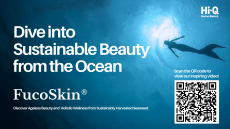EU green and digital agenda: Bridging ‘gap’ between pan-European policy and action key for fragrances - IFRA
![The fragrance industry will engage with the European Commission as policies and strategies are set out to achieve European Green Deal goals [Getty Images]](/var/wrbm_gb_food_pharma/storage/images/_aliases/wrbm_large/publications/cosmetics/cosmeticsdesign-europe.com/article/2022/02/14/european-green-deal-fragrance-industry-impact-and-future-policies-and-strategies/13238140-1-eng-GB/European-Green-Deal-fragrance-industry-impact-and-future-policies-and-strategies.jpg)
Last week, the International Fragrance Association (IFRA) and French perfume trade association PRODAROM hosted an event as part of the European Commission’s annual flagship event EU Industry Days that was designed to highlight industrial frontrunners, ongoing industrial policy discussions and improve the knowledge base of industry. Via two virtual roundtables, IFRA and PRODAROM hosted in-depth expert discussions on the resilience of the fragrance industry in a post-COVID era and how the category could work towards being a positive force for sustainability as the EU carved out its green and digital agendas under its wider European Green Deal.
Florence Ranson, independent EU affairs advisor and moderator of the event, said these discussions were more timely than ever and necessary given how “deeply rooted” the fragrance industry was in Europe, especially France, and the heritage, culture and economic value it offered.
“Like many other sectors, the fragrance sector has been forced to adapt to the pandemic and has done so quite well, actually. It was at the forefront of the production of essential hygiene products, for instance, and it has shown its resilience and adaptability. At the same time, the sector continues to be one of Europe’s success stories, particularly in terms of sustainability, because it paves the way for a green and digital transition – the main goals of Europe’s Green Deal,” Ranson told attendees, opening the event.
She said the goal of the roundtable discussions, therefore, was to “devise the basis for the most appropriate policies” needed for the fragrance industry to continue advancing in these areas.
Fragrance industry ‘ready to work with the EU’
Martina Bianchini, president of IFRA, said as the EU started to devise concrete policies under the European Green Deal, it was important the global fragrance industry voiced its concerns and needs.
“While rooted in Europe, the fragrance industry has also globalised over the last few years and, today, the fragrance value chain is a global value chain, but it has specific relevance and strength in Europe,” Bianchini said.
The global fragrance industry and value chain, she said, enabled consumer market sales of around €357bn each year worldwide, across personal care, home care and fine fragrances, and so it was vital industry participated in the brainstorming and definition of future policies.
“Our industry is committed to the safe and sustainable use of fragrance and we’re ready to work with the EU on making sure we strengthen resilience of the global value chain and ensure we get predictability and certainty among the policy options that the EU is selecting right now to enable our industry to not only strengthen our resilience, or not only to survive, but also to thrive in the future,” she said.
“…I’m very much looking forward to the fragrance industry being part of this dialogue with the EU as they look into their policy options under the various Green Deal strategies and sub-strategies and we would like to pledge that we are prepared to enter the dialogue and the negotiations.”
Bridging the gap between local, pan-European and global policies
Bianchini said one critical area industry wanted to highlight moving forward would be fulfilling wider European green and digital goals on-the-ground at a local level and ensuring fluidity and alignment across global markets.
“To go from pan-European EU policy level to the local level where the implementation of these policies takes place, you see that there is a gap that needs to be bridged – from the pan-European to the local and back from the local to the pan-European and ultimately global,” she said.
There is a necessary partnership between the local elected world and the economic world - Jean-Pierre Leleux, French politician and former senator of France’s Alpes-Maritimes region
Jean-Pierre Leleux, French politician and former senator of France’s Alpes-Maritimes region, agreed that engaging and aligning local industry leaders, elected representatives and the wider community would be key to successful policy rollouts.
“We have national elected reps and we have European elected Members of Parliament [MEPs] and they need to support the local communities and agglomeration communities in their work, and really their concerns in the various assemblies (…) There is a necessary partnership between the local elected world and the economic world,” Leleux said.
For the fragrance industry, local communities in France – notably within the Grasse region – would be central to this, he said, because of how rooted the fragrance industry was here. The Grasse region held UNESCO World Heritage Status, as part of the Intangible Cultural Heritage of Humanity list, and was also recognised by the French government for its know-how in perfume creation, he said – achievements that reflected the hard work of all artisans, manufacturers and other stakeholders involved in the “extremely dynamic” evolution of Grasse perfumery over the past decade.
Patrice de Laurens, head of the International Europe department for France’s Ministry of Agriculture, Agrifood and Forestry, said farm land dedicated to fragrances and aromatic plants in the South of France had doubled in size in the past ten years, with €1.4bn now associated with perfumes in this region. And the French government, De Laurens said, was committed to promoting this sector further, particularly within the remit of the European Green deal and its green and digital goals.
In our industry, our essential economic activities take place outside of Europe, and therefore competition is not only European - Jean Mane, president and CEO of The Mane Group
Jean Mane, president and CEO of French flavour and fragrance manufacturer The Mane Group, said it would be vital this competitiveness was maintained moving forward.
“Indeed, we have the European Single Market, but one needs to consider the fact that in our industries, in our industry, our essential economic activities take place outside of Europe, and therefore competition is not only European; it is a competition that we are facing everyday outside of Europe as well,” Mane said.
There remained “considerable work” to be done, therefore, given the “state of the European economy after the crisis”, he said, irrespective of how resilient fragrances had been. “We need to reconcile what is achievable right now, and what is achievable in the long-run. We will need to reconcile that within the ambitions we have if we want to maintain this competitiveness and resilience at a global level for the fragrance industry in Europe.”
EU Industrials Strategy – Single Market alignment crucial
Johanna Bernsel, deputy head of the European Commission’s Bioeconomy, Chemicals & Cosmetics (GROW.F.2) unit at Directorate-General for Internal Market, Industry, Entrepreneurship and SMEs (DG-GROW), said the European industrial strategy, updated in May 2021, would prove important for this moving forward.
“[The updated strategy] can be summarised in three strands. First of all, we’ve gathered it’s essential to strengthen the resilience of the Single Market. The Single Market remains extremely important for Europe; the crisis exposed the importance of free movement of goods but also services and workers,” Bernsel said.
“The second strand of conclusions was that we need to deal with the strategic dependencies. I think part of it is the importance of upholding international cooperation. Diversifying international partnerships is something we’re talking about right now, but also addressing the strategic dependencies from the perspective of the European industries.”
Bernsel said DG-GROW would publish a Staff Document at the end of this month specifically analysing the resilience of the chemicals industry and looking more closely at the critical dependencies within this sector.
The third conclusion, she said, was there was “still a very strong business case for the green and digital transition”.
As the European Commission continued to define its policies under the European Green Deal, Bernsel said close industry and stakeholder collaboration would be vital, including fragrances. It was “really crucial” any challenges felt by the chemicals and fragrance industry were understood by the European Commission and DG-GROW, she said. “And with the fragrance industry, we’ve heard a lot this morning about the importance of the social heritage, cultural heritage of France and Europe, and we recognise that very much also. We understand that very well.”
The Chemicals Strategy for Sustainability was one area Bernsel encouraged the fragrance industry to get closer to, particularly on the impact assessment and development of new hazard classes within this.
“At the end of the day, all this European regulation is a way of maintaining the integrity of the Single Market, the European market, rather than having Member States legislate individually,” Bernsel said.
![The five companies have been recognised for their environmental leadership across climate change, forests and water scarcity - a status only 12 global companies achieved in 2022 [Getty Images]](/var/wrbm_gb_food_pharma/storage/images/_aliases/wrbm_medium/publications/cosmetics/cosmeticsdesign-europe.com/article/2023/01/11/cdp-a-list-2022-features-beiersdorf-firmenich-kao-l-oreal-and-lvmh-as-triple-a-scores-for-environmental-leadership/16074266-1-eng-GB/CDP-A-List-2022-features-Beiersdorf-Firmenich-Kao-L-Oreal-and-LVMH-as-Triple-A-scores-for-environmental-leadership.jpg)
![The animal welfare charity hopes its REACH revision proposal drives wider uptake and acceptance of animal-free new approach methodologies (NAMs) for cosmetics safety assessment [Getty Images]](/var/wrbm_gb_food_pharma/storage/images/_aliases/wrbm_medium/publications/cosmetics/cosmeticsdesign-europe.com/article/2022/10/26/humane-society-international-reach-revision-proposal-calls-for-echa-procedural-technical-and-structural-change/15885212-1-eng-GB/Humane-Society-International-REACH-revision-proposal-calls-for-ECHA-procedural-technical-and-structural-change.jpg)
![[Getty Images]](/var/wrbm_gb_food_pharma/storage/images/_aliases/wrbm_medium/publications/cosmetics/cosmeticsdesign-europe.com/headlines/business-financial/new-study-identifies-challenges-for-fragrance-industry-to-meet-european-green-deal-objectives/15539618-3-eng-GB/New-study-identifies-challenges-for-fragrance-industry-to-meet-European-Green-Deal-objectives.jpg)
![Full ingredient disclosure, tech-forward formulations and nostalgic scents are going to be key in the next few years [Getty Images]](/var/wrbm_gb_food_pharma/storage/images/_aliases/wrbm_medium/publications/cosmetics/cosmeticsdesign-europe.com/article/2022/05/09/fragrance-trends-2024-include-transparency-biotech-and-nostalgia-say-experts-at-in-cosmetics-global/15396043-1-eng-GB/Fragrance-trends-2024-include-transparency-biotech-and-nostalgia-say-experts-at-in-Cosmetics-Global.jpg)
























